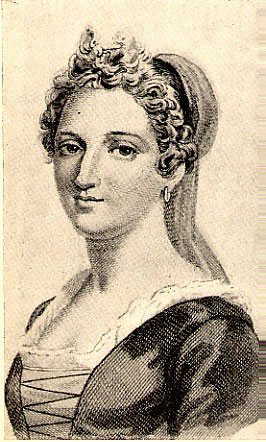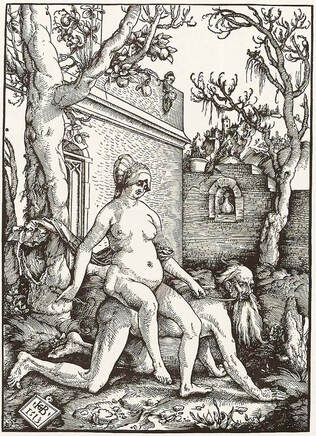 It is hard to ignore the amusing and explicit contempt employed by Marinella in her prose as she criticizes various male thinkers. Throughout The Nobility and Excellence of Women and the Defects and Vices of Men, Marinella often critiques Aristotle and his claim that women are, by nature, the inferior sex. In rebutting Aristotle, Marinella defends her natural philosophy and advocates for equal opportunity among the sexes. She writes, "But in our times there are few women who apply themselves to study or the military arts, since men, fearing to lose their authority and become women’s servants, often forbid them even to learn to read or write. Our good friend Aristotle states that women must obey men everywhere and in everything and not such for anything that takes them outside their houses. A foolish opinion and cruel, pedantic sentence from a fearful, tyrannical man. But we must excuse him, because, being a man, it is only natural he should desire the greatness and superiority of men and not of women. Plato, however, who was truly great and just, was far from imposing a forced and violent authority. He both desired and ordered women to practice the military arts, ride, wrestle and in short, to instruct themselves in the needs of the Republic… If [women] do not show their skills, it is because men do not allow them to practice them, since they are driven by obstinate ignorance, which persuades them that women are not capable of learning the things they do." (79-80) Marinella argues that, in order to maintain their authority, men do not allow women to receive an education or to practice the military arts. Out of fear, these men repress those, mainly women, who hold the potential to threaten their power. For Marinella, Aristotle serves as a prominent example of this “tyrannical man.” Marinella pits Aristotle against Plato “who was truly great and just.” Unlike Aristotle, according to Marinella, Plato rightly advocates for the training of women in various practices dominated by men such as riding, wrestling, and military arts. Any absence of skill or ability found among women in these fields results only from the lack of education and opportunities available to women. Marinella describes the circular nature of this phenomena as a self-fulfilling prophecy where men keep women from being educated and then become convinced that women cannot learn. According to Marinella, Aristotle’s endorsement of limiting women to household work and excluding them from schooling exposes the ignorance and injustices in his philosophy. Marinella also argues that Aristotle’s natural philosophy, which he uses to defend his anti-women views, fails upon further consideration. Both Marinella and Aristotle hold that a person’s bodily temperature says something about their character or nature. According to Marinella, however, Aristotle argues that men are hotter than women and therefore, more noble. She writes, “The good Aristotle, state[s] that women are less hot than men and therefore more imperfect and less noble. Oh what irrefutable and powerful reasoning! I now believe that Aristotle did not consider the workings of heat with a mature mind, nor what it signifies to be more or less hot, nor what good and bad effects derive from this” (130). Unlike Aristotle, Marinella argues that only moderate heat reflects a noble soul. “Excessive heat,” like that of men, “makes souls precipitous and unbridled” while “little and failing heat…is powerless for the soul’s operations” (130). Marinella declares that “women are cooler than men and thus nobler, and that if a man performs excellent deeds it is because his nature is similar to a woman’s, possessing temperate but not excessive heat” (131). As a defense of women as the superior sex, Marinella argues that Aristotle misunderstands the relationship between temperature and soul as the excessive heat of an individual exposes only the defects of their soul. If men are hotter than women as, according to Marinella, Aristotle believes they are, then they are inferior to women by nature. Not only does Marinella attack Aristotle’s misogyny in advocating for inequal opportunity among the sexes, she also highlights the failures of his natural philosophy in his attacks on the nature and temperature of women. Although decorated with colorful insults and bold sarcasm, Marinella’s arguments against Aristotle clearly reveal her expansive knowledge of thinkers like Plato and her own extensive natural philosophy. -MP Text source: The Nobility and Excellence of Women, and the Defects and Vices of Men. Edited and translated by Anne Dunhill, The University of Chicago Press, 1999.
First image info: Image taken from Maria Bandini Buti, Enciclopedia biografica e bibliografica italiana: poetesse e scrittrici (Roma, 1942), vol. 2, p. 10. Source: https://www.lib.uchicago.edu/efts/IWW/Portraits/HTML/A0190.html Second image info: Aristotle and his lover Phyllis. Hans Baldung Grien, 1515. http://www.ibiblio.org/wm/paint/auth/baldung/
0 Comments
Leave a Reply. |
Authors
Jacinta Shrimpton is a PhD student in Philosophy at the University of Sydney. She is co-producer of the ENN New Voices podcast Archives
May 2024
Categories
All
|

 RSS Feed
RSS Feed